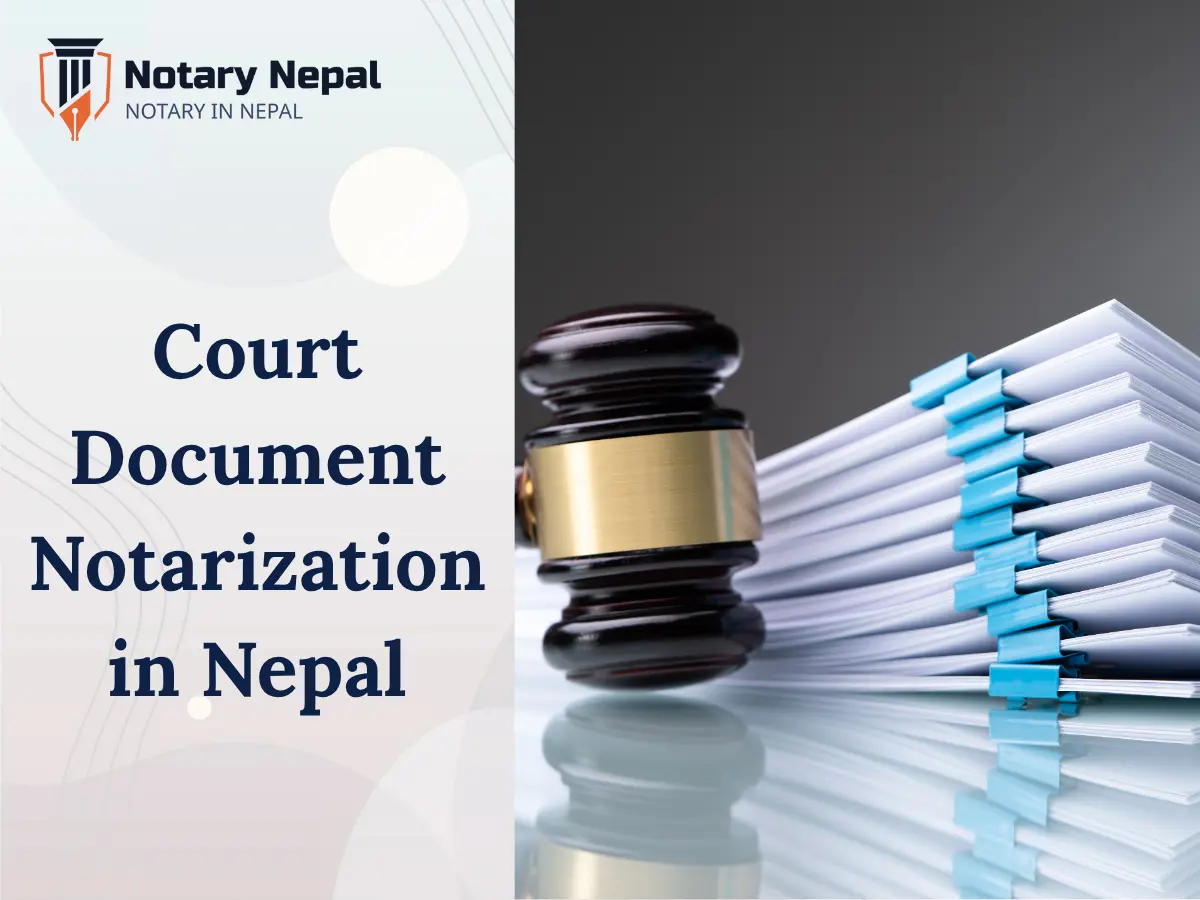

Table of Contents
Introduction
In Nepal, court document notarization is a vital legal process that ensures the authenticity and legality of documents used in judicial proceedings. Whether you're dealing with affidavits, court orders, or legal agreements, notarization adds a layer of credibility and is often a prerequisite for acceptance in courts and other legal entities.
This guide delves into the intricacies of court document notarization in Nepal, outlining the types of documents involved, the notarization process, legal requirements, and available services, including online options.
Understanding Court Document Notarization
Court document notarization involves a licensed notary public verifying the authenticity of documents related to legal proceedings. The notary confirms the identity of the signatories, witnesses the signing, and affixes an official seal, thereby certifying the document's validity.
Types of Court Documents Requiring Notarization
Several court-related documents necessitate notarization in Nepal:
- Affidavits: Sworn statements used as evidence in court.
- Power of Attorney: Legal authorization for one person to act on another's behalf.
- Court Orders and Judgments: Official decisions issued by a court.
- Legal Contracts and Agreements: Documents outlining terms agreed upon by parties.
- Property Deeds: Legal documents regarding the ownership of property.
- Witness Statements: Accounts provided by individuals relevant to a case.
The Notarization Process in Nepal
The process of notarizing court documents in Nepal typically involves the following steps:
- Preparation: Ensure the document is complete and all necessary information is accurately filled in.
- Identification: Present valid identification to the notary public to verify your identity.
- Signing: Sign the document in the presence of the notary.
- Notary Review: The notary reviews the document for completeness and compliance with legal standards.
- Certification: The notary affixes their official seal and signature, certifying the document.
It's important to note that only individuals licensed by the Nepal Notary Public Council are authorized to perform notarizations.
Legal Requirements and Compliance
In Nepal, notarization is governed by the Notary Public Act, 2063. Key legal requirements include:
- Licensed Notary: Only individuals certified by the Nepal Notary Public Council can perform notarizations.
- Proper Documentation: The document must be complete and comply with legal standards.
- Identity Verification: Signatories must provide valid identification.
- Record Keeping: Notaries are required to maintain records of all notarizations performed.
Failure to adhere to these requirements can result in the document being deemed invalid in legal proceedings.
Online Notarization Services
With advancements in technology, online notarization services have become increasingly accessible in Nepal. These services offer:
- Convenience: Ability to notarize documents remotely.
- Efficiency: Faster processing times compared to traditional methods.
- Accessibility: Useful for individuals unable to visit a notary in person.
To utilize online notarization services, individuals typically need to upload their documents, verify their identity through digital means, and participate in a virtual meeting with a licensed notary.
Translation and Notarization
For documents intended for use in jurisdictions where Nepali is not the official language, translation may be necessary. In such cases:
- Certified Translation: The document must be translated by a certified translator.
- Notarization of Translation: The translated document must then be notarized to verify its accuracy and authenticity.
This process ensures that the document is legally recognized in the foreign jurisdiction.
Notarization for Court Proceedings
In court proceedings, notarized documents carry significant weight. They:
- Establish Authenticity: Provide assurance that the document is genuine.
- Enhance Credibility: Increase the document's acceptance in legal settings.
- Facilitate Legal Processes: Streamline court procedures by providing verified documentation.
Courts in Nepal often require notarized documents as part of their standard procedures.
International Legal Use
For documents intended for use outside Nepal:
- Legalization: The document may need to be legalized by the Ministry of Foreign Affairs.
- Apostille: If the destination country is a member of the Hague Apostille Convention, an apostille may be required.
- Embassy Attestation: Some countries require documents to be attested by their embassy in Nepal.
It's essential to verify the specific requirements of the destination country to ensure proper compliance.
Notarization Services for Legal Professionals
Legal professionals in Nepal often require notarization services for:
- Client Documents: Affidavits, contracts, and other legal documents.
- Court Submissions: Documents submitted as part of legal proceedings.
- Power of Attorney: Documents authorizing representation in legal matters.
Engaging with a reliable notary service ensures that these documents meet all legal standards and are processed efficiently.
Cost and Timeframe
The cost and timeframe for notarization services in Nepal can vary based on:
- Document Type: Complex documents may incur higher fees.
- Service Provider: Different notaries may have varying fee structures.
- Urgency: Expedited services may be available at an additional cost.
On average, standard notarization services are completed within a day, while more complex cases may take longer.
Conclusion
Court document notarization is a critical component of the legal process in Nepal, ensuring the authenticity and legal standing of documents used in judicial proceedings. By understanding the types of documents involved, the notarization process, and available services, individuals and legal professionals can navigate the system effectively.
For those seeking reliable and efficient notarization services, both traditional and online options are available to meet diverse needs.
This article is for informational purposes only and does not constitute legal advice, advertisement, or solicitation. Notary Nepal and its team are not liable for any consequences arising from reliance on this information. For legal advice, please contact us directly.


